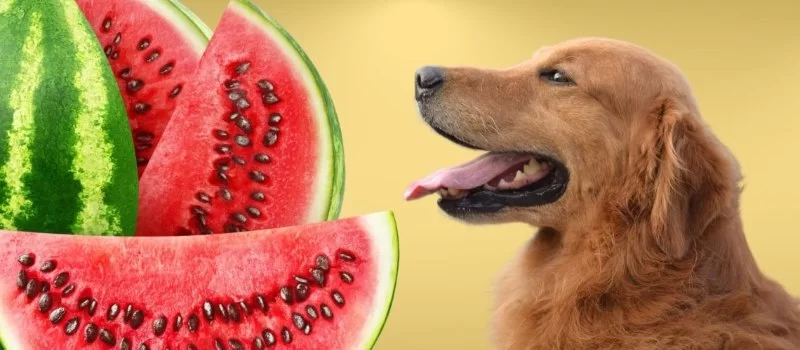Can Dogs Eat Watermelon with Seeds? What You Need to Know
Watermelon is a refreshing and healthy treat that many of us enjoy, especially during the hot summer months. But as a dog owner, you might be wondering, "Can my dog eat watermelon with seeds?" While watermelon can be a healthy snack for dogs, there are some important things to consider when feeding your dog this tasty fruit, especially when it comes to the seeds. In this article, we'll explore the potential risks and benefits of giving your dog watermelon with seeds and provide you with expert advice on how to keep your dog safe.
1. Benefits of Watermelon for Dogs
Before diving into the question of whether dogs can eat watermelon with seeds, let's first explore why watermelon is a popular snack for dogs. Watermelon is low in calories and packed with essential nutrients, making it a healthy choice for dogs when given in moderation. Here are some of the key benefits:
1.1 Hydration
Watermelon has a high water content, about 92%, which can help keep your dog hydrated, especially on hot days. Dehydration is a common issue in dogs, so offering them some watermelon can help maintain proper hydration levels.
1.2 Low in Calories
Watermelon is a low-calorie fruit, making it a guilt-free snack for your dog. It’s a great option for treating overweight dogs or those on a diet while still giving them something refreshing to enjoy.
1.3 Packed with Nutrients
Watermelon is rich in vitamins A, B6, and C, which are beneficial for your dog’s overall health. Vitamin A promotes healthy skin and vision, while vitamin C helps strengthen your dog’s immune system.
2. Are Watermelon Seeds Safe for Dogs?
Now, let’s address the question: can dogs eat watermelon with seeds? While watermelon itself is safe for dogs, the seeds can pose a problem. Here’s what you need to know:
2.1 Potential for Intestinal Blockages
The biggest concern with feeding your dog watermelon with seeds is the potential for intestinal blockages. If your dog consumes too many seeds, especially if they’re not chewed thoroughly, there’s a risk that the seeds could become lodged in their digestive tract, causing discomfort, pain, or even more serious issues that require veterinary intervention.
2.2 Choking Hazard
Watermelon seeds can also be a choking hazard, especially for smaller dogs or dogs that tend to gulp down food quickly without chewing. To prevent this, it’s important to remove the seeds before giving watermelon to your dog, especially if your dog tends to eat quickly or has a smaller mouth.
2.3 Are Watermelon Seeds Toxic to Dogs?
No, watermelon seeds are not toxic to dogs. However, even though they’re not poisonous, the risks of choking and intestinal blockages still make them a potential hazard. It’s always better to play it safe and remove the seeds before offering watermelon to your dog.
3. How to Serve Watermelon to Your Dog Safely
If you decide to give your dog watermelon, it’s important to do so safely. Here are some tips for serving watermelon to your dog:
3.1 Remove the Seeds
Always remove the seeds from the watermelon before giving it to your dog. You can cut the watermelon into small, bite-sized pieces, making it easier for your dog to enjoy without the risk of choking or ingestion of seeds.
3.2 Serve in Moderation
While watermelon is a healthy treat, it’s important to serve it in moderation. Too much watermelon can lead to digestive upset, including diarrhea or an upset stomach. Start with small portions and monitor your dog’s reaction.
3.3 Avoid the Rind
Do not give your dog the watermelon rind. While the flesh of the watermelon is safe and nutritious, the rind can be tough for dogs to digest and could lead to gastrointestinal issues.
3.4 Watch for Allergic Reactions
As with any new food, watch for signs of an allergic reaction after giving your dog watermelon. Symptoms may include itching, swelling, or gastrointestinal issues like vomiting or diarrhea. If your dog shows any of these signs, discontinue the treat and contact your vet.
4. Other Fruits Safe for Dogs
If your dog enjoys watermelon, they may also enjoy other fruits that are safe for dogs. Some fruits provide similar health benefits and can be great additions to your dog’s diet. Here are some other dog-friendly fruits to consider:
4.1 Apples
Apples are a great source of fiber and vitamin C, but remember to remove the seeds and core before offering them to your dog. Apples can be a great crunchy treat for your dog.
4.2 Blueberries
Blueberries are packed with antioxidants and are low in calories, making them a healthy and tasty treat for your dog. They’re also small enough to serve as a quick snack.
4.3 Strawberries
Strawberries are another great fruit that dogs can enjoy. They are low in calories and high in vitamin C, but they should also be given in moderation to avoid digestive upset.
Conclusion
Watermelon can be a safe and healthy treat for dogs when given in moderation, but it's important to remove the seeds and rind to avoid any potential health risks. Always monitor your dog after introducing a new food and consult your veterinarian if you have any concerns about their diet. If you're looking for expert care or advice on your dog's health, visit Hidden Brook Veterinary for tailored recommendations and professional services to keep your dog healthy and happy.












